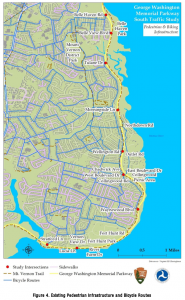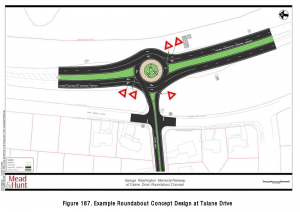 The National Park Service (NPS) recently released the results of a two-year study to improve safety and access to the George Washington Memorial Parkway (GWMP), one of Northern Virginia’s most treasured recreation and transportation resource. The intent of the study was to develop safety improvements that could be implemented using existing funds while preserving the parkway’s historic appearance.
The National Park Service (NPS) recently released the results of a two-year study to improve safety and access to the George Washington Memorial Parkway (GWMP), one of Northern Virginia’s most treasured recreation and transportation resource. The intent of the study was to develop safety improvements that could be implemented using existing funds while preserving the parkway’s historic appearance.
The Park Service is hosting a virtual community event at 7 pm, Monday, May 10, to discuss the plan. FABB encourages local riders to participate in this meeting to Speak Up! for additional safety improvements that benefit bicyclists and pedestrians. Also, plan now to join FABB on May 20 for another virtual meeting on the study (details below).
The study is a mixed bag of added improvements and missed opportunities.
FABB advocated during the study period for safe crossings at all intersections along the six-mile span between Alexandria and Mount Vernon. Our main position was that crossings should be more than just paint and we specifically advocated for the creation of roundabouts to slow driver speed and prioritize pedestrian/bicyclist safety. Roundabouts are a proven means to allow easier crossings for pedestrian and bikes by eliminating conflict points and providing more refuge space.
We also strongly recommended road diets and other measures to calm driver speeds. We noted that the average daily traffic volume was well under the Federal Highway Administration’s recommended limit for road diets, which meant that reduced the number of e car lanes from four to two would not create any additional delays for motorists. Road diets are proven to reduce crashes and make it easier for people to cross on foot or bike safely will little or no effect on driver travel time. If both a road diet and roundabouts were implemented, single lane roundabouts would be much simpler for drivers (less signage needed) and would be a shorter, safer for people to cross on foot or bike safely.
 On the plus side, the final study acknowledges the safety benefits of modern roundabouts (p. 231) and found them “viable” at three intersections: Tulane Drive, Morningside Lane, and Wellington Road (p. 235). Unfortunately, the study only recommends implementing a roundabout at Tulane (p. 251). Still, a roundabout at Tulane would be a major improvement at an intersection where many Mount Vernon Trail (MVT) users cross the parkway.
On the plus side, the final study acknowledges the safety benefits of modern roundabouts (p. 231) and found them “viable” at three intersections: Tulane Drive, Morningside Lane, and Wellington Road (p. 235). Unfortunately, the study only recommends implementing a roundabout at Tulane (p. 251). Still, a roundabout at Tulane would be a major improvement at an intersection where many Mount Vernon Trail (MVT) users cross the parkway.
The study is disappointing in that it recommends a road diet as the safety improvement for the intersections between Tulane Drive and Stratford Lane—Morningside, Wellington, Waynewood, and Vernon View. The proposed road diet would reduce the four travel lanes to three with two northbound, one southbound, and one turn lane. For Morningside and Wellington, the study asserts that road diets will work just as well as a roundabout at lower cost (the study estimates that the cost of a roundabout is $1.5 – 2.5 million).
Another disappointment in the study is the lack of any significant safety improvements at the intersection with Belle View Blvd. The study found that this intersection—which is used by many MVT users to cross the GWMP—had greatest number of reported crashes (p.33). The study recommends a median U-turn at Belle View and states that this will help “reduce areas of conflict.” It concludes that a roundabout “would not fit” at this intersection (p. 237 and figure 188). In our view, the proposal provides no direct help for pedestrians and bicyclists crossing at this intersection.

The study’s other safety recommendations include increased enforcement against speeding, DUI, and distracted driving, increased visibility of lane markings and Mount Vernon Trail crosswalks, and the removal of vegetation at intersections to improve visibility.
GWMP Chief of Staff Aaron LaRocca was quoted in the Washington Post saying that “As we implement improvements to the parkway, we will monitor their effectiveness and assess adjustments as needed.” This week’s meeting is not too early for riders to let the NPS know that adjustments will be needed by sharing their stories and experiences with speeding traffic.
FABB will continued to engage with NPS on this important safety matter.
Plan now to join us and the Friends of the Mount Vernon Trail on May 20 at 7:00 pm for a virtual meeting with GWMP Superintendent Charles Cuvelier, who will give a presentation on the recent Mount Vernon Trail (MVT) Corridor Study and answer questions about the safety assessment. Watch our social media for links to participate in the meeting.
[Post updated on May 13, 2021, to add information about the May 20 meeting. ]
